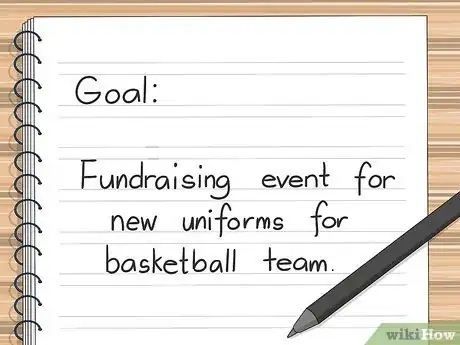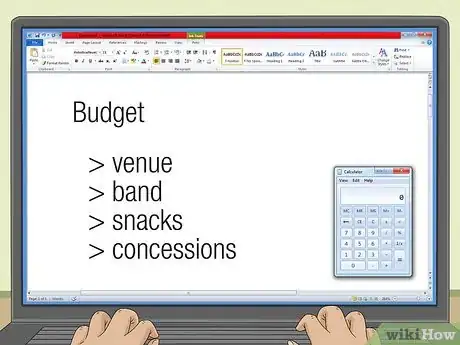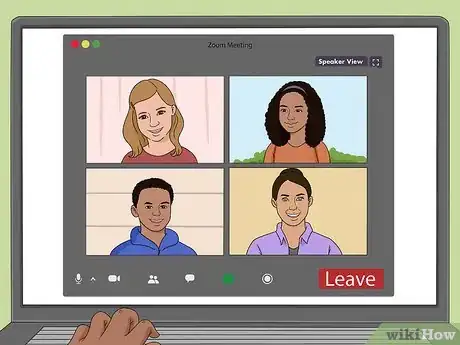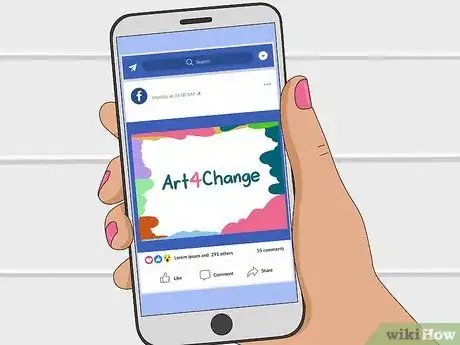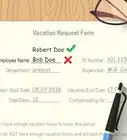This article was co-authored by Stefanie Chu-Leong. Stefanie Chu-Leong is the Owner and Senior Event Planner for Stellify Events, an event management business based in the San Francisco Bay Area and California Central Valley. Stefanie has over 15 years of event planning experience and specializes in large-scale events and special occasions. She has a BA in Marketing from San Francisco State University.
There are 7 references cited in this article, which can be found at the bottom of the page.
This article has been viewed 10,560 times.
Gone are the days of stuffy school events—let’s have some fun! A school event is a great way to spread awareness, raise some money, or just have a good time. Hosting an event is actually easier than you may think. With proper planning and preparation, you can avoid feeling overwhelmed and keep things running smoothly. We’ve put together a handy list of things you can do to make your school event a great one.
Steps
Write down the goal or goals of your event.
-
Use them to help guide your event planning. It’s easy to get lost in the maze of event planning, so start off on the right foot by setting clear goals that you hope to accomplish with your event. They could be things like raising awareness for an issue, raising funds for a project, or just having some fun and entertainment. Jot down your goals and use them to help plan out various aspects of your event.[1] X Research source
- For instance, let’s say you’re holding a fundraising event for new uniforms for your school’s basketball team. You could include info about how to donate, use images of the new uniform design, and ask one of the basketball players to speak at the event.
Make an agenda for longer events.
-
Structure your event with a well-planned agenda. An agenda is a document that outlines your event schedule. If you have a longer event with lots of different sections, speakers, and guests, it’s a simple way to keep everyone on the same page and keep things running smoothly. Draft a document that lists the sessions of your event in order, includes the names of the speakers, and mentions the theme or subject of each session.[2] X Research source
- For example, if you’re hosting an event for a school election, you could include agenda items such as, “Principal Johnson welcomes students; Jack Smith discusses the importance of voting in elections; Senior class candidates give campaign speeches,” and so on.
- Print out copies of your agenda to hand out to guests and other speakers so people can follow along.
Create a budget for your event.
-
Allocate your money for your event’s costs and expenses. Start by calculating how much money you have to spend for your event. Then, set aside the necessary funds for things like renting a venue, hiring a band, and snacks and concessions. Be sure to allocate funds for decorations and supplies like paper and ink for printing flyers.[3] X Expert Source

Professional Event Planner Expert Interview. 24 January 2020. [4] X Research source
Secure a venue for in-person events.
-
Choose the space you’ll use to host your event. Find a space that can adequately host and support your event and reserve it for the day of your event. If you’re hosting your event at your school, you may be able to use your school’s gym, auditorium, or outdoor space to hold it. If you’re planning to host your event off-campus, look for venues in your area and reserve one.[5] X Research source
- If you plan to have performers or use media such as music or slideshows, make sure the venue you choose can support them.
- Make sure the event space has enough seating to accommodate your guests or organize a way to set up chairs for people to use.
Live stream virtual events.
-
Choose a platform to host your virtual event. If you can’t gather in person, there are a ton of ways you can host your event virtually. Platforms such as Zoom and Google Meet make it easy for folks to log in and attend your event. Select a platform and create your event so you can send out links to invite folks to your event.[6] X Research source
- For example, you can make an event on Zoom and it’ll generate a Zoom meeting link, which you can then include in your event’s invites and social media. When the event starts, all people need to do is click on the link and they’re in!
Put up posters and hand out flyers.
-
Get people’s attention to promote your school event. Make some fun and attractive posters that advertise what your event is about as well as when and where it is. Put up posters in high-traffic areas in your school such as hallways and the cafeteria. You can also send out a digital image by email or on social media to spread the word and build up interest.[7] X Research source
- Make sure it’s okay for you to put up posters in your school.
- Be sure to clearly state how people can attend your event. For instance, your poster could say something like “Where? The Gym! When? Friday @3:30!” or “Look up the Art4Change event page on Facebook for a link to the virtual event!”
Promote your event on social media.
-
Use updates and content to get the word out. Whether you’re hosting your event virtually or in-person, social media is an invaluable tool you can use to spread awareness. Create an event page for your event and include graphics and text that tells people what it’s all about and where it’ll be located. Invite people to like your event page and post a link to the page on your own social media so people can find it.[8] X Research source
- You can also check with your school’s principal to see if you can get a link to your event page posted on the school’s website and social media as well.
Rehearse hosting your event.
-
Practice in front of your friends, family, or mirror. Plan out what you’re going to say at your event and rehearse it as many times as it takes to memorize it. Put together an audience using your friends or family members so you can practice in front of real people and get some feedback. The more you rehearse hosting your event, the more comfortable you’ll feel.[9] X Research source
- It’s okay to feel nervous! With practice and preparation, you’ll be able to handle it like a pro.
Start your event with a quote, joke, or anecdote.
-
Grab people’s attention from the beginning. Use an icebreaker to get your guests (and yourself) comfortable and ready to engage in the event. An interesting story or a good quote can set the tone and get people to start paying attention right from the start.[10] X Research source
- For instance, if you’re hosting a talent show, you could start with a joke like, “Hi everybody, before we begin, we need to do a quick mic check. Will everyone named Michael please stand up. This concludes the mic check.”
Introduce your speakers or performers.
-
Warm up the audience for your guests. If your event has multiple sessions or performances, introduce them before they start so your audience knows who’s up next. You could also give a little intro that briefly explains what they’ll be doing or discussing so your guests know what to expect.[11] X Research source
- For example, you could say something like, “Up next, we’ve got Sarah Miller to tell us the history of our school’s chess club and how your donations can help keep them going.”
Stay calm if something doesn’t go according to plan.
-
Take a deep breath and keep a cool head. While you can definitely plan and organize to avoid major problems, the truth is, you may have some hiccups at your event. Someone may forget to bring a power cord or you may not have enough pamphlets. It’s okay. Keep calm so everyone else follows your lead. Do what you can to solve the problem with a level head.[12] X Research source
- According to Murphy’s Law, anything that can go wrong will go wrong![13] X Research source
Conclude the event by thanking everyone.
-
Thank your guests and attendees for coming to wrap things up. After each of your speakers or performers is finished, thank them for participating. When you’re event is finished, thank everyone involved and your guests for participating and then conclude the event.[14] X Research source
- You could say something like, “Thank you to Principal Brown for letting us use this space, and thank you so much for coming out and supporting us!”
Expert Q&A
-
QuestionHow do I plan a school event?
 Stefanie Chu-LeongStefanie Chu-Leong is the Owner and Senior Event Planner for Stellify Events, an event management business based in the San Francisco Bay Area and California Central Valley. Stefanie has over 15 years of event planning experience and specializes in large-scale events and special occasions. She has a BA in Marketing from San Francisco State University.
Stefanie Chu-LeongStefanie Chu-Leong is the Owner and Senior Event Planner for Stellify Events, an event management business based in the San Francisco Bay Area and California Central Valley. Stefanie has over 15 years of event planning experience and specializes in large-scale events and special occasions. She has a BA in Marketing from San Francisco State University.
Owner & Senior Event Planner, Stellify Events Determine how much you have to spend as a budget and be sure to stay within it.
Determine how much you have to spend as a budget and be sure to stay within it.
Warnings
- Check with your school administrators before you do anything like hold an event or put up flyers around the school.⧼thumbs_response⧽
You Might Also Like
 3 Cool Methods for Inventing a Nickname
3 Cool Methods for Inventing a Nickname


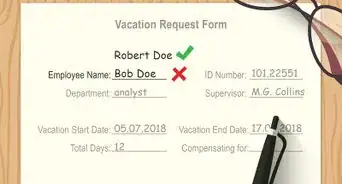










References
- ↑ https://www.finalsite.com/blog/p/~board/b/post/how-to-host-virtual-school-events
- ↑ https://www.finalsite.com/blog/p/~board/b/post/how-to-host-virtual-school-events
- ↑ Stefanie Chu-Leong. Professional Event Planner. Expert Interview. 24 January 2020.
- ↑ https://today.cofc.edu/2015/09/14/5-event-planning-tips-for-students/
- ↑ https://today.cofc.edu/2015/09/14/5-event-planning-tips-for-students/
- ↑ https://www.finalsite.com/blog/p/~board/b/post/how-to-host-virtual-school-events
- ↑ https://www.canva.com/learn/23-tips-and-ideas-to-promote-your-school-event/
- ↑ https://www.canva.com/learn/23-tips-and-ideas-to-promote-your-school-event/
- ↑ https://english.eagetutor.com/situational-conversation/how-to-host-a-social-event-at-school
- ↑ https://english.eagetutor.com/situational-conversation/how-to-host-a-social-event-at-school
- ↑ https://english.eagetutor.com/situational-conversation/how-to-host-a-social-event-at-school
- ↑ https://today.cofc.edu/2015/09/14/5-event-planning-tips-for-students/
- ↑ https://www.wonderopolis.org/wonder/what-is-murphys-law
- ↑ https://english.eagetutor.com/situational-conversation/how-to-host-a-social-event-at-school
About This Article

